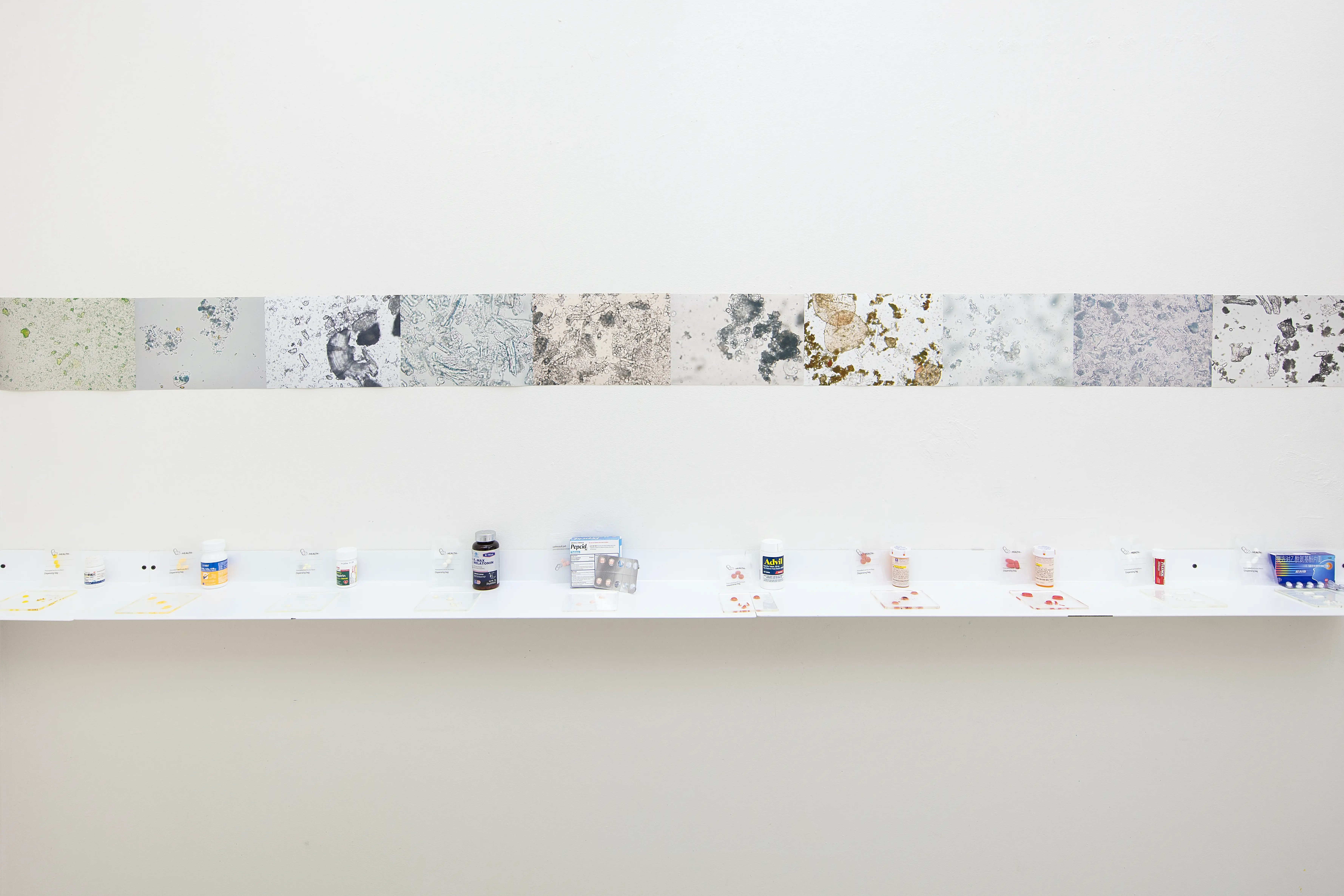Exploring the Ethical Dimensions of Pharmaceuticals in Yuhanxiao Ma’s "Modest Witnesses"
- Chen Ruolin
- Oct 16, 2024
- 3 min read
A Critical Examination of Pharmaceuticals
In "Modest Witnesses," Yuhanxiao (Maggie) Ma delves into the complexities and paradoxes of pharmaceutical practices, offering a nuanced reflection on the ethical dimensions that govern this global industry. Through a series of four meticulously crafted rooms, the exhibition navigates a landscape where trust, faith, and exploitation intersect, forcing viewers to reconsider their perceptions of health, medicine, and power.
Room 1: Microscape Medica - The Hidden Narratives of Pharmaceuticals
The exhibition opens with "Microscape Medica," a multimedia installation that immediately immerses the audience into the minuscule world of medicine. Archival prints and microscope slides showcase pills in various forms, both packaged and encapsulated in resin. At first glance, the installation offers an alluring aesthetic—pills are objects of sleek design, modern science made tangible. Yet, the work's commentary runs deeper. Pills, Ma suggests, hold narratives of faith and corporate control, blending hope with the pursuit of profit.
Room 2: Solutio - The Process of Pills Dissolving and the Breakdown of Trust
Moving into the second room, viewers are drawn to a video installation titled "Solutio," in which Ma captures the dissolution of pills in acidic water, mimicking stomach acid. The visceral imagery, accompanied by the unsettling sound of pills breaking apart, provides an intimate look at how pharmaceuticals interact with the body. The dissolving pills become a metaphor for the breakdown of boundaries between medical solutions and corporate agendas, questioning how much control we have over the substances we ingest and the systems that produce them.
Room 3: The Guinea Pigs - A Haunting Critique of Drug Testing Ethics
In "The Guinea Pigs," Ma presents a haunting critique of pharmaceutical testing and exploitation. The room features sculptures of guinea pigs with human faces, underscoring the blurred lines between test subjects—both animal and human—in the relentless march of drug development. X-ray images juxtapose the human skull with the body of a guinea pig, a chilling reminder of how medical imagery can obscure deeper ethical concerns. This work challenges viewers to reconsider the role of vulnerable populations in drug testing.
Room 4: The Pill Altar - Questioning the Devotion to Pharmaceuticals
The exhibition culminates in "The Pill Altar," a large-scale inflatable installation that serves as both a shrine and a critique. With kneeling cushions and a custom scent designed by the artist, the installation invites viewers to confront the almost religious devotion many place in pharmaceuticals. Ma likens pharmaceuticals to modern-day deities, entities we trust to solve our deepest problems. Yet, this inflated trust is what the artist seeks to challenge, encouraging reflection on the unquestioned power of pharmaceutical systems.

Conclusion: Yuhanxiao Ma's "Modest Witnesses" and the Future of Ethical Healthcare
What strikes me most about "Modest Witnesses" is Ma's ability to transform the familiar into something uncanny and deeply unsettling. The pills, objects which some of us see and consume daily, are elevated to symbols of power and vulnerability—representations of both trust and betrayal. Ma's work exposes the tension between the human need for relief and the pharmaceutical industry's commodification of that need.
Through each room, the artist weaves a narrative of complicity, where our own participation in the system becomes painfully clear. We are not just witnesses; we are part of a cycle where health, profit, and exploitation are intertwined in ways that often remain hidden in plain sight. For me, this exhibition raises profound questions about how much we really know—and want to know—about the substances we put our faith in.
Through "Modest Witnesses," Ma succeeds in creating a space where art and science meet, asking us to critically engage with the ethics of healthcare. Each room in the exhibition offers a different lens through which to view the complex relationships between trust, exploitation, and the global pharmaceutical industry, encouraging us to question the narratives we have come to accept as truth.















Comments